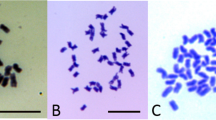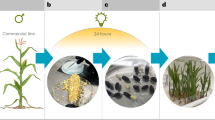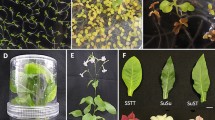Abstract
COLCHICINE treatment of seedlings of certain sorghum lines has resulted not only in the expected polyploids, but also in diploid plants which are mutant for many characters. Some of these diploid mutants breed true immediately while others give segregating progenies1–3. The original hypothesis to explain their appearance suggested that a somatic reduction of the chromosomes (similar to that observed by Huskins4) occurred and was followed by duplication. These mechanisms could result in the concentration of chromatin from ancestors of a putative allopolyploid. However, investigations have produced either no or little cytological evidence for duplication or relocation of chromatin5,6. In addition, mutant characters which have been studied have shown Mendelian inheritance7–10. The alternative hypothesis was then proposed that, in addition to a balanced somatic reduction of the chromosomes after application of colchicine, mutations at many loci also occurred prior to duplication back to the diploid number.
This is a preview of subscription content, access via your institution
Access options
Subscribe to this journal
Receive 51 print issues and online access
$199.00 per year
only $3.90 per issue
Buy this article
- Purchase on Springer Link
- Instant access to full article PDF
Prices may be subject to local taxes which are calculated during checkout
Similar content being viewed by others
References
Franzke, C. J., and Ross, J. G., J. Hered., 43, 107 (1952).
Ross, J. G., Franzke, C. J., and Schuh, L. A., Agron. J., 46, 10 (1954).
Franzke, C. J., and Ross, J. G., J. Hered., 48, 46 (1957).
Huskins, C. L., J. Hered., 39, 310 (1948).
Harpstead, D. D., Ross, J. G., and Franzke, C. J., J. Hered., 45, 255 (1954).
Sanders, M. E., Ross, J. G., and Franzke, C. J., Amer. J. Bot., 48, 536 (1961).
Foster, A. E., Ross, J. G., and Franzke, C. J., Crop Sci., 1, 72 (1961).
Foster, A. E., Ross, J. G., and Franzke, C. J., Crop Sci., 1, 272 (1961).
Erichsen, A. W., Sanders, M. E., and Franzke, C. J., Proc. South Dakota Acad. Sci., 40, 244 (1961).
Chen, J. R., Sanders, M. E., Franzke, C. J., and Ross, J. G., Rec. Gen. Soc. Amer., 30, 68 (1961).
Dirks, V. A., Ross, J. G., and Harpstead, D. D., J. Hered., 47, 229 (1956).
Atkinson, G. F., Franzke, C. J., and Ross, J. G., J. Hered., 48, 259 (1957).
Sanders, M. E., Franzke, C. J., and Ross, J. G., Amer. J. Bot., 46, 119 (1959).
Franzke, C. J., Sanders, M. E., and Ross, J. G., Nature, 188, 242 (1960).
Sanders, M. E., Franzke, C. J., and Ross, J. G., Gen. Sec. Bot. Soc. Amer. (August 10, 1960).
Author information
Authors and Affiliations
Rights and permissions
About this article
Cite this article
SANDERS, M., FRANZKE, C. Somatic Reduction of Tetraploid Sorghum to Diploid Mutants following Colchicine Treatment. Nature 196, 696–698 (1962). https://doi.org/10.1038/196696a0
Issue Date:
DOI: https://doi.org/10.1038/196696a0
This article is cited by
-
Unequal chromosome division and inter-genomic translocation occurred in somatic cells of wheat–rye allopolyploid
Journal of Plant Research (2012)
-
Anther culture for haploid and doubled haploid production
Plant Cell, Tissue and Organ Culture (PCTOC) (2011)
-
Effect of mass selection for seed density in populations derived from Avena abyssinica x A. sativa amphidecaploids
Euphytica (1990)
-
Colchicine-induced variants in sunflower
Euphytica (1983)
-
Apomictic maternal diploids in tetraploid Job's tears
Theoretical and Applied Genetics (1975)
Comments
By submitting a comment you agree to abide by our Terms and Community Guidelines. If you find something abusive or that does not comply with our terms or guidelines please flag it as inappropriate.



